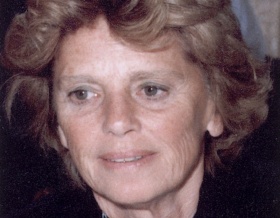Microbiologist and external member of the MTA Ágnes Ullmann passes away
Ágnes Ullmann, an external member of the MTA passed away on 25 February 2019 in Paris. She was one of the most widely known and renowned microbiologist and molecular biologist of Hungarian descent.
 Ágnes Ullmann (1927 − 2019) Credit: Fonds Jacques Monod
Ágnes Ullmann (1927 − 2019) Credit: Fonds Jacques MonodÁgnes Ullmann was born in 1927 in Szatmárnémeti (Satu Mare, Romania) in Transylvania. She started her studies in Kolozsvár (Cluj Napoca, Romania), which she completed in ELTE, Budapest after moving to Hungary in 1948. Her career as a researcher began in the Department of Medical Chemistry, Budapest, which was at the time headed by Brúnó Straub F. She worked here until 1960. Jacques Monod, a Nobel laureate, met Ullmann during her short professional visit to Paris. In 1960, Monod helped Ullmann and her husband, Tamás Erdős, a former colleague of Albert Szent-Györgyi, escape to Paris in a dangerous and complicated human trafficking project. From then on until her retirement and actually even after that until her health allowed, Agnes Ullmann worked for the Pasteur Institute. At first, she worked together with Monod, but later was appointed as an individual scientific director. She was given French citizenship in 1966 and was elected as a member of the board of directors in the Pasteur Institute in 1982. She was a member of the European Molecular Biology Organization (EMBO) from 1983 until her death. In 1995, she received the Louis Pasteur Medal of the French Academy, in 1996 she was awarded the title Knight of the Legion of Honour (Chevalier de la Légion d’Honneur) of France. In 2002 she received the highest international award in the field of microbiology, the Robert Koch Gold Medal.
Agnes Ullmann’s life is described in Sean Carrol’s 2013 book entitled Brave genius: A Scientist, a Philosopher, and Their Daring Adventures from the French Resistance to the Nobel Prize, in which the third hero besides Monod and Camus, i.e. the two protagonists named in the title, is Agnes Ullmann. Furthermore, Ullmann also published her autobiography the Annual Review of Microbiology 2012, entitled A Fortunate Journey on Uneven Grounds.
Her most important scientific results are as follows. While still living in Hungary, she and her husband published two important articles in Nature on the effects of streptomycin. A basic concept of microbiology, promoter, was introduced in an article by her as a first author (co-authored by two Nobel laureates, Monod and Jacob). She greatly contributed to the discovery of the mechanism of catabolite repression and the clarification of the role cyclic AMP plays in the process. As an individual researcher-professor, she was primarily interested in the biology of Bordatella pertussis, the whooping cough pathogen. She addressed this topic in her inaugural speech at the Hungarian Academy of Sciences.
Among her several highly successful and excellent students, it is worth naming Maxime Schwartz, who became the director of the Pasteur Institute. Ullmann also excelled in safeguarding Monod’s heritage, she edited his Festschrift published twice: Origins of Molecular Biology. A Tribute to Jacques Monod.
She was a warm friend of almost all leading scientists in molecular biology in both the United States and Europe, not only because of her scientific merits, but also owing to her attractive personality, excellent taste and high culture.
The author of this obituary started his scientific career as her immediate colleague and student. At first, I was highly enchanted by her skill and speed when conducting experiments. Later I learned to admire the open-mindedness with which she managed to become an excellent molecular biologist starting from the swamp of Lisenko’s pseudoscience in Hungary, despite that she was not a trained biologist. It is worth mentioning that the best Hungarian friends of the Erdős–Ullmann couple were the Kulka family. The celebrated actor, János Kulka, is Agnes’s godchild. In Paris, their most intimate friends were the family of Lucien Hervé, a world-famous photographer of Hungarian descent.
Epilogue: after her death, the Pasteur Institute decided to name the wonderful lilac grove in the park of the institute after Agnes Ullmann.
Pál Venatianer
